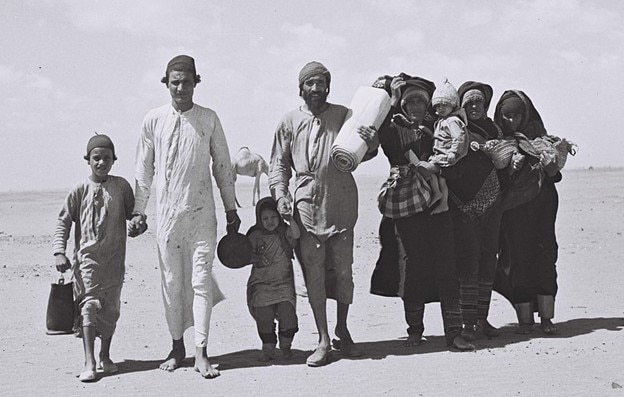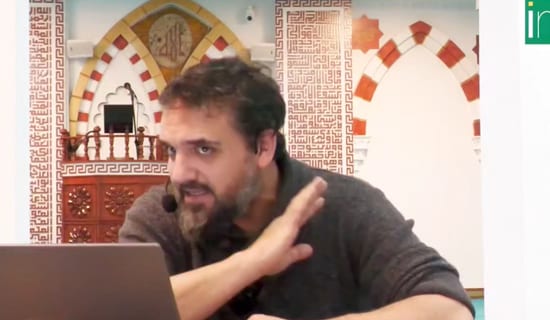They tried to cancel Churchill and Napoleon but they failed. The long-dead statesmen still had enough dazzle and enough of a popular following to blunt the braying of leftist revisionists. In both the United Kingdom and in France, there is still, for now, enough "historical capital" grounded in a national narrative to fend off the statue topplers.

Yemeni Jewish refugees arriving in Israel, 1948 – photo used as model for new monument
Historical capital in the West seems very much in decline. This is true both in terms of historical knowledge and in the power that history holds.[1] It seems to me that historical capital is just another kind of valuable asset, as we speak of intellectual capital or social capital (or indeed just capital), an asset or wealth that has some sort of value.
But the old currency is changing and losing its value. It is in a slow, steady process of decline seeming to lead to its replacement by some new sort of Western concoction involving racial and sexual politics wrapped in the language of progressive modernity. The old coin used to have great power: history, myth, legend, religion, victory, defeat, conquest all combined in an enduring if intangible deposit of sensations and symbols that could inspire love, sacrifice, and steadfastness, that could inspire pride.
The decline is relative and happening in different ways and at different rates in the West. Raising high the Union Jack or Tricolour or Old Glory can be problematic in the countries those flags represent, but it seems to be less risky than using the national flag in Spain, for example.[2] Some Spanish scholars lamented recently that the incredibly heroic cavalry charge of the Cazadores de Alcántara, wiped out in Morocco a century ago, is mostly unknown among Spanish schoolchildren, while in Britain schoolboys still recite the stirring words of the "Charge of the Light Brigade."[3]
But if you want to look to where historical capital still remains intact and valuable, you have to leave the West and look East. In the West, statues and memorials of imperialists are threatened; in the East, in places like Turkey, they are going up. But you could say the same of Egypt or Iran or Russia or China.
The recent conflict in Gaza is perhaps another example of historical capital deployed with great power. The terrorist group Hamas names some of its missiles acquired from Iran after its martyrs. Other Muslims, even in the West, called upon a new Saladin[4] to rise up and destroy Israel, or chanted "Khaybar Khaybar, Ya Yahud," recalling Muhammad's attack on a the Jews of Khaybar in 628 A.D. that supposedly led to the extermination of the Jews of that region.[5] American or European conquerors – Cecil Rhodes or Columbus – may have been cancelled, but the seductive power of other histories, other conquerors, remains for some.
And if the Palestinians have a powerful narrative, that of the Jewish people in their ancient homeland also has real power, stretching over thousands of years.[6] A recent monument unveiled in Jerusalem, based on a famous photo of Yemeni Jews from 1948, commemorates the one million Middle Eastern Jews displaced and finding their home in Israel.[7]
SUPPORT OUR WORK

It is richly ironic that a "progressive" West that largely despises national symbols, that burns American flags – in America – also embraces the symbols and language of Palestinian nationalism. When the labor union at the New Yorker magazine, long a symbol of bien pensant liberalism, expressed its "solidarity with Palestine, from the River to the Sea" (they subsequently deleted the tweet and apologized), they were embracing a type of Manifest Destiny – just not an American one.[8]
Notice how the nationalist and religious narrative of Palestine across broad populations has a power of mobilization and outrage not found elsewhere among, for example, other Muslim communities – like Uyghurs or Rohingya.[9] This is because the choice of both supposed victim and supposed victimizer has inherent power. Asians are being assaulted on the streets of American cities, but it isn't because of Xinjiang. But Jews are assaulted in the West both for being Jews (assaulted already even before the 2021 Gaza conflict) and because of Israel.
Of course, it is the great Cypriot scholar Vamik Volkan, working from the University of Virginia, who wrote so powerfully about the impact of "chosen traumas" and also "chosen glories" in his work. He focused particularly on historical narratives of oppressed subject peoples and nations in the Ottoman Empire, particularly in the Balkans, connecting them to the rhetoric of strongmen like Serbia's Milosevic. Today the best example may be Turkey's Erdoğan, who presents the 1923 Treaty of Lausanne, which codified Ataturk's victory over Greeks and Armenians, as some sort of defeat.
The rancid authoritarianism of a Hamas or Erdogan or Xi's China is certainly nothing for the West to emulate. But Western governments do need to understand that history can be as much of, or more, of a valuable asset than it is a burden. Historical narratives can be both organic and fabricated; they are convictions that can be both deeply held by the masses and cynically manipulated from above (both are true in the cause of Palestine in the Arab world). In the Middle East, you see Iran manipulating the image of Jerusalem for its own benefit – the conquest of Aleppo was on the road to Jerusalem – while Qatar, which once sheltered Al-Qaeda's Khalid Sheikh Muhammad, the 9/11 mastermind, now not only shelters Hamas leaders like Isma'il Haniya but packages him as a leader with all the symbolic trappings of an historic cause, organizing an extremely rare public demonstration in the heart of Doha, with fawning live coverage on Al-Jazeera.[10]
Historical narratives can indeed be grounded in dangerous concepts of blood and soil, or around some sort of unifying ideology or rallying cry – "Workers of the World Unite!" But regardless of the source, such narratives can inspire and unite as much as demonize. These narratives don't actually need to be true; they just have to be cherished and believed. We see our adversaries use this power for their own purposes and against us, and we all too often ignore such power at our peril. It was indeed the Corsican Ogre himself, Napoleon, who, when creating the Legion d'honneur, pushed back at the critics of national grandeur and understood the power of a narrative. "There has been too much tearing down, we must rebuild," he responded. "The nation itself – what is it? Scattered grains of sand... We must plant a few pillars of granite as anchors in the soil of France."
*Alberto M. Fernandez is Vice President of MEMRI.
[1] Thehill.com/opinion/education/411700-when-it-comes-to-knowledge-of-american-history-we-are-a-nation-at-risk, October 17, 2018.
[2] Vozpopuli.com/espana/mujer-agresion-protestas-Tarragona-bandera-espana_0_1291371201.html, October 15, 2019.
[3] Youtube.com/watch?v=dPJd2IfHBoU, May 6, 2021.
[4] Twitter.com/JakeWSimons/status/1394969059628888068, May 19, 2021.
[5] Lesoir.be/372685/article/2021-05-17/manifestation-pro-palestinienne-la-police-bruxelloise-lance-une-enquete-sur, May 17, 2021.
[6] Jpost.com/israel-news/rare-1900-year-old-bar-kochba-coin-unveiled-ahead-of-lag-baomer-627638, May 11, 2020.
[7] Blogs.timesofisrael.com/for-the-forgotten-victims-of-hate-at-israels-birth-a-memorial/?fbclid=IwAR1l1VTiJz_xKNpEpg54UKEIqEBOa4wlHyCP_8Ik_J3QJNSj48Bd3kLhilI, May 16, 2021.
[8] Foxnews.com/media/new-yorker-union-accused-of-urging-israels-genocide-for-supporting-palestinians-from-the-river-to-the-sea, May 20, 2021.
[9] Worldpoliticsreview.com/articles/29661/on-abuses-against-uyghurs-in-china-muslim-governments-give-beijing-a-free-pass, May 19, 2021.




